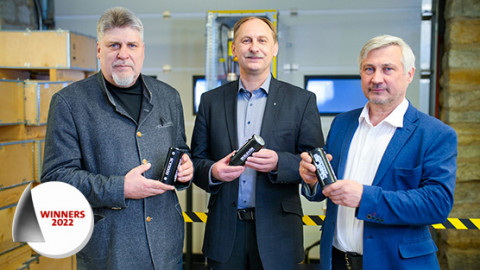
photo: EPO
The European Patent Office (EPO) announced the winners of the European Inventor Award earlier today. Viewers worldwide joined the event via livestream and celebrated as inventors and teams from Belgium, Brazil, Canada, Estonia, France, Hungary, Spain, Switzerland, the UK and the US received trophies, all of whom were chosen by an independent jury comprising of leading experts in their fields. This was also the first time our young inventors were celebrated, with the inaugural Young Inventors prize.
With a message from His Serene Highness Albert II, Sovereign Prince of Monaco, a tie for first place in the Young Inventors prize and the revelation of Katalin Karikó as the Lifetime achievement laureate, the 2022 edition offered several surprises for viewers.
EPO President, António Campinos stated that
The breadth and depth of innovation honoured today is simply astounding. The European Inventor Award winners are shining a path forward to a more promising future. They have demonstrated tenacity, agility, and perseverance as they have invested time, energy, resources and above all ingenuity and creativity to bring solutions to life.
Industry
- Jaan Leis, Mati Arulepp and Anti Perkson (Estonia):
- Superior carbon-based materials for ultracapacitors
Estonian scientists Jaan Leis, Mati Arulepp and Anti Perkson optimised a material called curved graphene for use as an electrode in ultracapacitors, providing quick-charging, long-lasting energy sources for industry and electric cars.
Research
- Claude Grison (France):
- Decontaminating polluted soils with metal-eating plants
Researcher Claude Grison developed a method of using plants to extract metal elements from polluted soil around mining sites and then uses these as ‘ecocatalysts' to make new molecules for the chemical, pharmaceutical and cosmetics industries.
Non-EPO countries
- Donald Sadoway (Canada/United States):
- Liquid metal batteries for storing renewable energy
Chemist Donald Sadoway developed a liquid metal battery to store solar and wind energy. These liquid metal batteries retain 99% of their original capacity over 5 000 charging cycles. Comprised of locally sourced raw materials, his battery also provides a cost-effective long-term storage solution.
Small and medium-sized enterprises (SMEs)
- Madiha Derouazi, Elodie Belnoue and team (Switzerland/France):
- Therapeutic vaccine platform to treat cancer
Together with their team, Madiha Derouazi and Elodie Belnoue pioneered a new medical platform to make therapeutic cancer vaccines that help the immune system recognise and destroy cancer cells in the body of a patient.
Lifetime achievement
- Katalin Karikó (Hungary/United States)
- Modified mRNA for lifesaving vaccines and therapies
Hungarian biochemist Katalin Karikó developed a way to modify messenger ribonucleic acid (mRNA) so it could be safely used in the human body, paving the way for its use in COVID-19 and other vaccines, as well as prospective therapies for cancer and heart disease.
Popular Prize
- Elena García Armada (Spain):
- World's first adaptable robotic exoskeleton for children
Spanish professor Elena García has developed an adaptable robotic exoskeleton for children who use wheelchairs. The exoskeleton enables the children to walk during muscle rehabilitation therapy, improving their well-being and extending their life expectancy.
The Popular Prize is a special prize in that it is voted for by the public between 17 May and the beginning of the ceremony. The Office received around 23 000 votes for 13 finalists at this year's Award.
Young Inventors prize
After several rounds of jury voting no clear winner emerged, so the EPO took an exceptional measure and declared a first-place tie. Each of the first-place winners will receive a cash prize of EUR 20 000, while the runner up will be awarded EUR 10 000.
- Victor Dewulf and Peter Hedley - first place (Belgium/United Kingdom):
- AI-driven waste management
From an initial prototype that operated with dumpster-dived trash and a treadmill bought off eBay, Victor Dewulf and Peter Hedley developed an AI-driven recognition and sorting system that waste facilities can use to quickly and accurately separate garbage, ensuring that more is recycled.
- Erin Smith - first place (United States):
- AI brings earlier care to new Parkinson's patients
Inspired by YouTube videos of actor and Parkinson's patient Michael J. Fox, American student Erin Smith developed an AI-powered app that uses video footage to enable early detection of Parkinson's disease which could lead to earlier intervention to slow the development of the condition.
- Rafaella de Bona Gonçalves - runner up (Brazil):
- Biodegradable pads and tampons to combat period poverty
To tackle the widespread problem of period poverty, Rafaella de Bona Gonçalves developed biodegradable menstruation products for disadvantaged groups in her country using biodegradable fibres, such as Brazil's readily available banana harvest waste.
If you were unable to watch the live event, you can follow the recording via inventoraward.org.
Next year's event will be held in Valencia and public nominations for the European Inventor Award 2023 are now open.